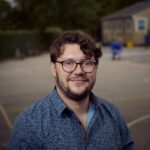Year 5
My aim is to create a stimulating, nurturing, and inclusive learning environment where all class members are encouraged to be the best they can be and are valued for who they are. I encourage pupils to develop their independence, support each other in their learning, and strive for excellence. I have high expectations for all, ensuring they can achieve their very best. A growth mindset approach to learning helps pupils understand that mistakes are opportunities for growth and that perseverance is the key to success. I believe learning should be enjoyable, and pupils should have a voice in how they learn.
In English, we aim to continue fostering the children’s love of reading by using challenging and engaging texts as a platform for discussion and for writing in different genres. Pupils are encouraged to share books they have enjoyed and to discover new authors. Dedicated independent reading time and access to a diverse class library help build their confidence and enthusiasm as readers.
We explore fiction, non-fiction, and poetry to build an understanding of the purpose and effect of writing on an audience. Pupils study model texts, analysing varied sentence structures, effective vocabulary, and their impact on the reader. These texts then serve as stepping stones for planning, writing, and editing their own work.
Every term, the class further develop their spoken language skills by planning and delivering a talk to each other on a range of different topics or interests.
In Mathematics, children build on the strong mathematical foundations established earlier in their education, enabling them to extend their knowledge and confidently tackle new concepts. Pupils are encouraged to apply their newly acquired knowledge and extend their understanding through problem-solving and reasoning challenges
Anthony Tugwell
Year 4 Class Teacher
Year 5 Events
| English Curriculum | |
|---|---|
|
Reading
Speaking and Listening
|
Writing – Transcription
Writing – Composition
Writing – Vocabulary, Grammar and Punctuation
|
Maths
| Mathematics Curriculum | |
|---|---|
|
Number and Place Value
Calculations
Fractions, Decimals and Percentages
|
(Fractions, Decimals continued)
Measurement
Geometry
Statistics
|
Subject Overview by Term
| Subject | Term 1 | Term 2 | Term 3 | Term 4 | Term 5 | Term 6 |
|---|---|---|---|---|---|---|
| Science | Earth and Space | Earth and Space | Forces | Living things and their Habitats | Properties and their Materials | Animals including Humans |
| Computing | Computing systems and their Networks | Creating Media | Programming A – Selection in Physical Computing | Data and Information | Creating Media | Programming B – Quizzes |
| RE (Oxford Diocese Long Term plan) |
Do Sikhs need the Guru Granth Sahib? | Was Jesus the Messiah? | How far does the Mosque contribute to the Muslim concept of Ummah? | What did Jesus do to save humans? | What does it mean to live a good life? | What kind of King was Jesus? |
| History & Geography |
Ancient Egyptians | North and South America | Comparative study of three regions | Crime and Punishment | The Rainforest | |
| Art & DT | Sketching | Sewing | Printing | Wooden Frames | Pop Art | Cooking |
| PE | Gymnastics/Invasion games | Fun Fitness/Invasion games | Dance/Invasion games | OAA/Tennis | Striking games/athletics | Striking games/athletics |
| PSHE | Relationships | Living in the Wider World | Health and Wellbeing | |||
| Music | Music Express-Solar system Christmas Performance |
Musical Performance including musical instruments | Music Express-At the Movies Celebration |
|||
| MFL | On Holiday | Hobbies | Eating Out | School Trip | Seasons | Environment |




